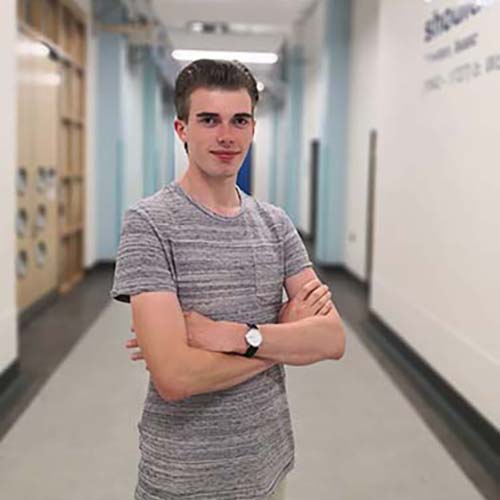Martin Riis is currently studying Electronic and Electrical Engineering (BEng) and is part of the University of Strathclyde Eco-Vehicle team who design fuel-efficient vehicles. The group participated in the Shell Eco-Marathon in July 2019, where they passed all technical inspections and gained the highest efficiency of any UK battery-powered car at the event. Find out how Martin's course helped him succeed.
Why did you choose to study at Strathclyde?
When I was applying, Strathclyde stood out for being one of the top engineering universities in the UK. During the interview and accompanying tour, all the staff in the Electronic and Electrical Engineering department were very professional and knowledgeable and gave me a fascinating insight into the research that’s done in the department. The research and classes taught also aligned well with the area of electronic engineering that I am interested in working in after graduating.
What was the application process like?
I found the application process very simple, after sending my UCAS application off, the Electronic and Electrical Engineering department contacted me to arrange a date for an interview. The interview itself was more like a casual chat with a member of staff about my interests and why I wanted to study at Strathclyde. It also included a tour of the department where we were shown some of the projects done by researchers and undergraduate students. Shortly after the interview, I received a conditional offer (I was only in 5th year at this point and so had not sat my highers yet).
What has your experience of Strathclyde been like so far?
Overall, my experience at Strathclyde has been fantastic, the lecturers are helpful and approachable and we have access to great facilities, both for helping with our course and extra-curricular. Certainly in my department, Strathclyde have excellent industry connections and provide students with many opportunities to interact with potential employers through scholarship fairs, dinners and similar networking events.
Has Strathclyde lived up to your expectations?
Definitely, I expected an excellent education and great facilities, however, I have been pleasantly surprised by the new student focused developments on campus (teaching and learning building, Strathclyde Sport, etc.) and the variety of opportunities students have right from first year for professional development and industry engagement.
What has been your highlight of your time here so far?
For sure, it’s being part of the University of Strathclyde Eco-Vehicle team! It’s given me countless fantastic experiences; allowed me to make new friends in Strathclyde and other universities around Europe; and also given me the opportunity to expand my industry contacts.
What work was involved for the Shell Eco-Marathon?
The team started design of our highly efficient electric vehicle back in September 2018. From then until the competition, we have worked to refine the initial designs, test them and finally manufacturing the completed design.
We have different sub-teams focused on designing and manufacturing a specific part of the vehicle: chassis, steering, body and electronics. We also have a marketing sub-team responsible for the image portrayed by the team and a research and development sub-team who work to investigate and test ideas for the future.
How was your experience in the competition?
The Shell Eco-Marathon is a week-long event that was held at Mercedes-Benz World beside the historic Brooklands race track in Surrey this year. For the first few days, we completed the technical inspection, this comprises of a series of checks performed by the organisers to ensure our vehicle conforms to the rules and is safe to drive. The last couple of days are taken up by the millage challenge, where teams attempt to complete all 11 laps of the nearly 1.5 km track.
Due to some issues with the brakes and electronics, we were only able to get out onto the track on the last day, however, managed to get a complete and valid run first time!
As with most teams, we had many ups and downs, however, thankfully managed to end on a high, achieving an efficiency of 122 km/kWh, equivalent to over 2,500 MPGe of petrol – the highest efficiency of any UK team in our category!
What kind of improvements would you like to make for next year?
We are happy with how a lot of the elements in the vehicle performed this year and as such we are planning on making incremental changes, improving parts that we feel didn’t work so well and keeping those that did. This will allow us to put greater emphasis on tailoring parts to function more effectively and be more efficient.
How did your degree help you succeed?
My degree formed the backbone of what I needed to succeed in both the design of the vehicle’s electronic systems and in management. I feel USEV has provided me with an excellent platform to apply the knowledge I have gained in my course to a real engineering project.
What is your favourite thing about studying in Glasgow?
I grew up near Glasgow and as such, I am near family and high school friends. Being the biggest city in Scotland, Glasgow has great shops, entertainment and nightlife. Strathclyde’s location in the city centre means students are always close to the aforementioned amenities as well as accommodation and transport hubs.
What advice would you give to anyone thinking about studying at Strathclyde?
Make sure to attend open days at least once and ask lots of questions, the second time around I found out about another course from the EEE department that was more specific and aligned to what I wanted to do after I graduated. I hadn’t heard about this one before then and it’s now the course I am on.
Strathclyde are also continuing to work on improving the campus for the benefit of students and there will most likely be new facilities opening up during your time here!
